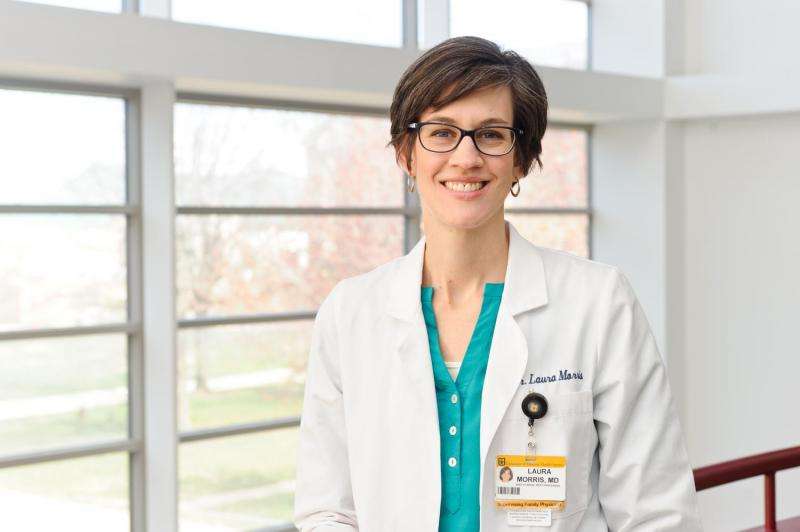Laura Morris, M.D., a primary care physician at MU Health Care's Family Medicine-Callaway Clinic in Fulton, Missouri, and assistant professor of clinical family and community medicine at the MU School of Medicine. Credit: MU Health
More and more physicians are becoming parents during their medical residency training. While most residency programs offer support for resident physicians during pregnancy, no formal ways to support parenting residents exist beyond the immediate birth of their children. Following a recent study of conflicts with work and family life, a University of Missouri School of Medicine researcher suggests that supportive residency training programs are needed to assist physicians who are managing demanding work and personal lives.
"Residents with children are juggling multiple roles as medical trainees, physicians and parents," said Laura Morris, M.D., a primary care physician at MU Health Care's Family Medicine-Callaway Clinic in Fulton, Missouri, and assistant professor of clinical family and community medicine at the MU School of Medicine. "Residency is a time of competing demands as trainees attempt to balance work roles as learners and clinicians with personal roles as parents and partners. These conflicts can cause both positive and negative outcomes on their families and residency experiences."
Morris and her colleagues conducted focus groups with family medicine residents who also were parents. She asked the residents to discuss how parenting during residency had affected their well-being and how they perceived their roles as parents and physicians. Morris said the participants described both positive and negative outcomes from their decisions to become parents during residency, yet overwhelmingly supported greater scheduling flexibility at work.
"Participants described negative residency experiences, such as being required to bounce back and forth between working days and nights, and the uncertainty of when and how to access sick leave," Morris said. "Participants also described feeling guilty for multiple reasons during their residencies, including not being able to offer more support to their spouse."
Morris said her study highlights the need for more residency programs that support parents, and believes residency programs should offer certain services to residents to help ease their load.
"Residency programs that are supportive of physician parents should ensure policies for parental leave are well publicized and equally applicable to male and female residents," Morris said.
"In addition, these programs should explore the possibility of offering paid parental leave or on-site day care, as well as creating ways for residents to share parenting information and resources with each other."
Morris' study, "Parenting During Residency: Providing Support for Dr. Mom and Dr. Dad," recently was published in Family Medicine.
Journal information: Family Medicine
Provided by University of Missouri-Columbia



















